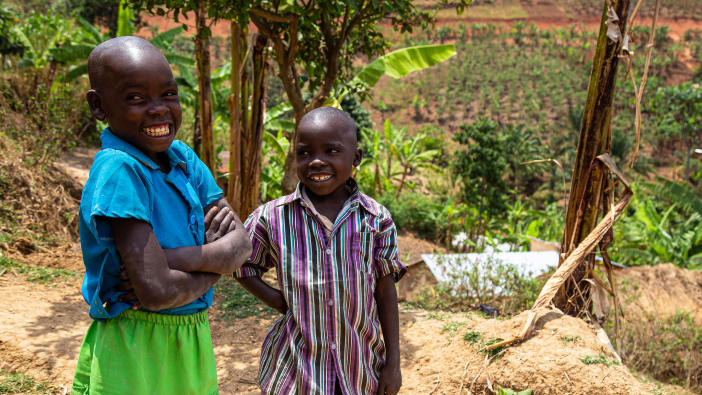Personal space
Trigger warning: this story mentions sexual violence which some readers may find upsetting.
First, meet Bawili and her daughter in the Democratic Republic of Congo (DRC) for a more personal look at the situation.
The conversation one evening went a bit like this:
Ebinda (14): Mum, I need the toilet.
Bawili: I’m trying to cook dinner! Never mind, it’s still quite light. You can go on your own.
Well, why wouldn’t a 14-year-old be able to go to the toilet on her own? Why would she even need to ask?
But, for Ebinda and Bawali, the ‘toilet’ was not a convenient enclosure with safe walls, a door to shut and protection for privacy. It was just an unsafe space in the bush.
Ebinda returned from her short, simple trip to use the toilet bruised, battered and pregnant. She dropped out of school and lost the rest of her own childhood.
Ebinda’s father had been killed many years earlier during a civil war in the Democratic Republic of Congo. So Bawili had taken her children and fled to Tanzania where they spent ten years in a refugee camp. When they were forcibly returned to DRC, where this incident took place, they had no home, no clean water and no toilet.
They had to walk for 90 minutes, three times a day, to collect water from Lake Tanganyika, but the water was dirty and many people fell sick with cholera. Using the conveniences was nothing like convenient. When in lieu of a loo you’re forced to use a secluded area of nature, the natural possibilities include snake bites, darkness, fear, indignity... and rape.
‘I felt so sad at what had happened,’ says Bawili. ‘I remember thinking that if my husband was still alive, maybe we would have had a toilet and a bathroom.’
Safe walls
What Bawili was missing was support. Someone to step in and stand alongside her in the face of difficult circumstances. We can’t replace her husband, but we can help build some safe walls around her – physically and metaphorically.
Bawili was able to join a community health club set up through an initiative called Toilet Twinning. These clubs provide people with training about hygiene and encourage them to build toilets. And as villagers construct toilets together, they are also building community and learning to support one another. Health club members helped build Bawili and her family a toilet too.
‘We’re learning to work together… to love each other,’ says Bawili. ‘If there is no love, we cannot build a good society. We used to be ashamed when people shouted abuse as we walked to the bush. I’m so happy to have a toilet.’
Bawili is now the president of her community health club.
The bottom line
Everyone needs a loo to keep them safe from disease and indignity.
Girls, especially, are placed at risk by not having access to a safe toilet. Not having a toilet in the safety of their home makes them vulnerable to attack; at school, if there are no facilities, life gets particularly difficult when they have their period. It causes many girls to miss school for that week each month. Some get so frustrated that they give up altogether. The lack of education keeps them trapped in a cycle of poverty. Instead of the things that should be, it’s young people’s futures that are going down the toilet.
Thanks to the resulting increased productivity and lower health care costs, giving people access to toilets is a hugely cost-effective way to improve people’s lives.
Are you sitting down?
Back in 2008, Sian Atterton taped the picture of a latrine onto the loo seat at her home with a sticky note bearing the words: ‘I’ve twinned your loo.’ She had sponsored a toilet in Burundi as a Christmas present for her husband Mark. Mark was a manager at Cord, an NGO involved in peace and reconciliation work, and he was inspired!
Together, Tearfund and Cord came up with Toilet Twinning.
It’s now a Tearfund campaign that raises funds to support our water and sanitation work around the world. Specifically, it helps provide clean water, proper toilets and hygiene training to some of the world’s poorest communities.
For a one-off £60 donation, you make it possible for a family somewhere to have a toilet. They become your ‘toilet twin’ and you receive a certificate with the GPS coordinates of the latrine and a photo to hang in your own privy with pride. You can even choose which country your toilet has its twin in.
Currently the options are:
- Nepal
- Malawi
- Mozambique
- Tanzania
- Nigeria
- Pakistan
- South Sudan
- Côte D’Ivoire
- Zambia
- Uganda
- Democratic Republic of Congo
Toilet humour
Since the start of Toilet Twinning, we’ve seen all kinds of toilet humour lead to fun fundraising, but the situation is far from a joke.
Since 2010, more than 140,000 toilets have been twinned, giving about 840,000 people in 45 countries access to safe sanitation. And we estimate that around 1 million people receive hygiene education each year thanks to the programmes that Toilet Twinning helps fund.
That leaves only 3.5 billion more people in need of a toilet.
Are you ready to spend a penny?
Click here to twin your toilet.












